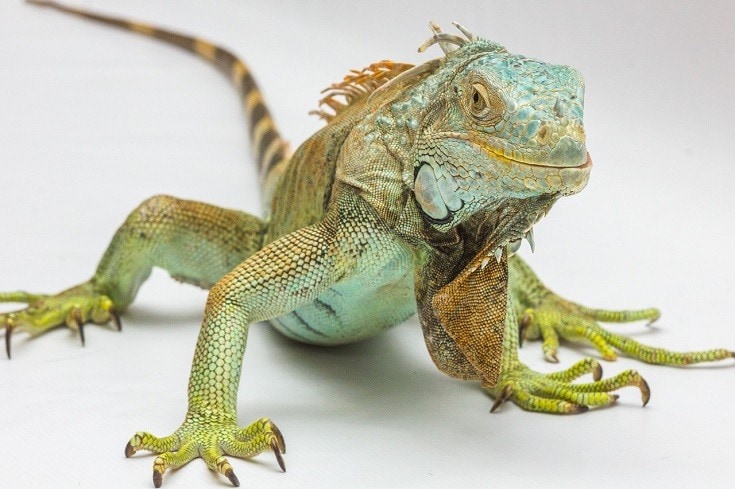

Iguanas make fun and interesting pets for those who take an interest in colorful exotic pets. They make excellent pets for experts in the industry. They have a huge commitment and are quite demanding when it comes to their care. These creatures can live for an exceedingly long time and grow exceptionally large. Iguanas can become aggressive if they are not tamed properly and need a patient owner who has extensive knowledge in their care. If they are not regularly cared for, they can become shy and unwilling to be touched or handled. Iguanas are rewarding pets when all their conditions and requirements are met.
This article will detail the care and requirements an iguana requires, as well as explain how to keep them happy and healthy.

Iguana Facts
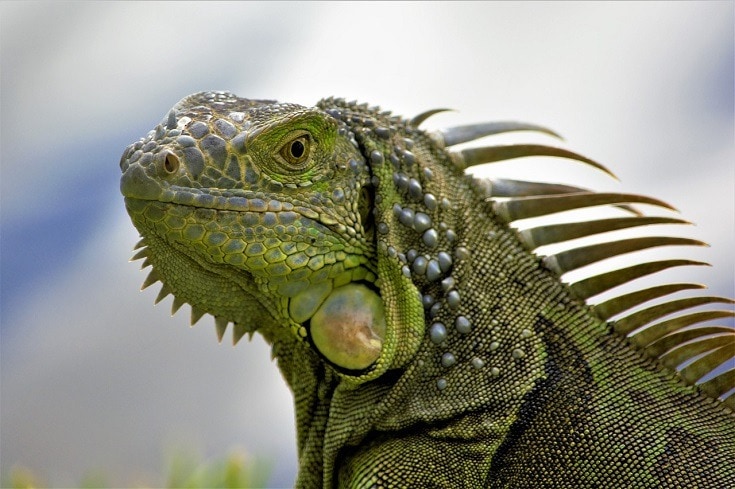
- Scientific name: Iguana Iguana
- Family name: Iguanidae
- Size: 5 to 7 feet
- Lifespan: 12 to 18 years
- Color forms:
- Weight: 20 pounds
- Care level: Difficult
Iguanas are native to both Central and South America and have quickly become one of the most popular pet lizards. They are primarily herbivores and are native to tropical conditions. They can grow to a maximum size of 7 feet long and come to weigh 20 pounds. Iguanas have a pale scale towards the back of their head to mark the parietal eye. They have an interesting bodily communication method and have sense organs that send signals to the pineal gland. This helps them to distinguish between day and night.
Iguanas enjoy foraging for their meals and are naturally suited to digest various plant matter. They have a strong skull that can produce a hefty bite to chew and process a wide variety of vegetation. The most popular pet iguana is green iguana. They have been introduced into captivity for several years and have sparked an interest in many long-term lizard owners.
Are Iguanas Good Pets?
Iguanas make poor pets for the average household. They are not good pets for people who do not have several years of lizard ownership and research. They are diurnal and are awake during the day and will rest during the night. They require a lot of human intervention to meet their cares high demands. They are not self-sufficient and can become untamed if they are not handled regularly. Iguanas naturally have an aggressive nature that makes them a dangerous pet for children and adults who are not familiar with how to handle them.
This is not to say they make bad pets. They make good pets for lizard experts who can tame them properly and meet all their care requirements. They are not good pets for people who stay in an apartment or suite and have no space for a large enclosure that will stem several meters. If you have young children in the household, an iguana will not be a good pet for you. They do have sharp teeth and a strong jaw that has the potential to inflict danger via a nasty bite if they are distressed.
When kept appropriately do have the potential to make fun and interactive pets who you will spend a lot of time looking after them.
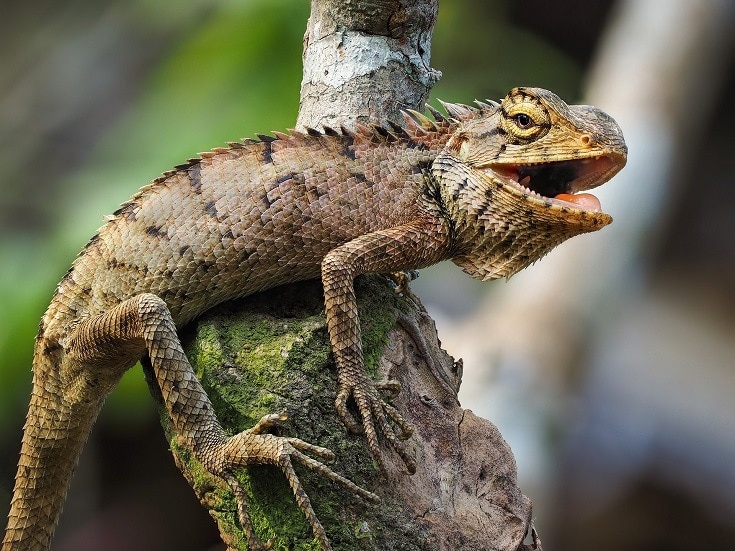
Where Can I Get a Pet Iguana?
Pet iguanas can be purchased from reputable breeders, adoption centers, exotic pet stores, and online. If you are looking for older iguanas who are already tamed, you may want to investigate adopting an iguana from a local wildlife rescue society. These iguanas will usually be given up by previous owners for various reasons and are most likely to have already been tamed. Iguanas from pet stores are usually sold when they are noticeably young and can be easily tamed as they grow older in your care.
If you decide to purchase an iguana egg online, you will have to incubate it and hatch it on your own. This is only to be done by experienced iguana owners who have professional knowledge on incubation, hand-rearing iguanas, and know about their age-appropriate diets. Breeders usually charge a higher price for their iguanas because of their genetic quality. A bonus is that some breeders will take the iguanas before selling them. Although this will be included in the price of your lizard pet under the label of ‘already tamed’.
Note: Most places classify iguanas as exotic pets, and therefore, you need to have a credible permit to keep one of them in your possession. It is illegal to purchase an iguana off black market websites and should be avoided at all costs. The iguana trade industry aims to trap unsuspecting customers who are not able to realize a certified seller or a smuggler. Always ask for documentation, breeding papers, and permit identification before you make a purchase. Consult your local wildlife service if you are unsure where to get a credible iguana from.
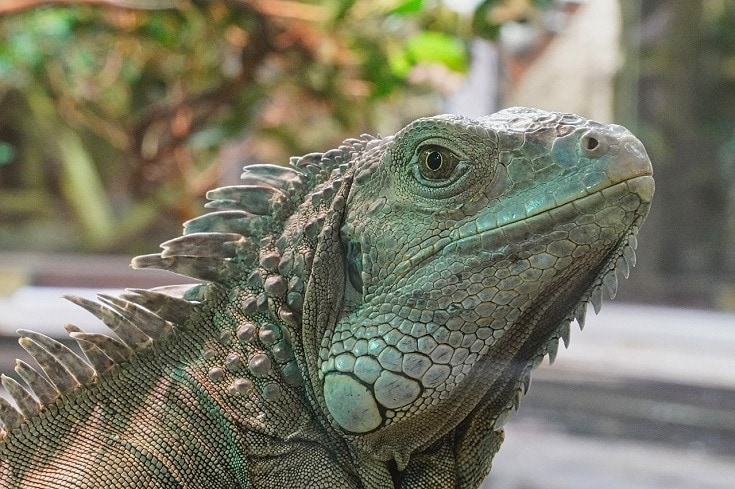
How Much Does It Cost to Own a Pet Iguana?
Iguanas are arguably one of the most expensive exotic pets to own. Since they grow to several feet in length, they need an incredibly large enclosure.
The enclosure will usually be constructed from a strong mesh that will be pricey. You can expect to pay between $100 alone for the mesh to construct a secure enclosure. Another factor that will influence the cost is the equipment in the enclosure which can cost between $250 to $400 to put together. Although most of the components in the enclosure can be DIYed, it will still be costly to get the supplies needed.
Their diet should be specifically formulated, and a portion of quality food will cost more than standard commercial mixes. You can expect to pay between $25 to $40 for a monthly supply of food for your iguana.
Your iguana will need to get a check-up at a qualified exotic vet that specializes in lizards. This can cost between $100 to $200 for a check-up and $250 to $800 for surgeries, medications, and vet interventions.
As a total estimate, you will pay roughly $850 when you first purchase your new pet iguana and $150 as a monthly maintenance price.

What Kind of Home Does My Pet Iguana Need?
Most of the cages sold commercially for iguanas are too small to ethically house them in the long term. These small pet store cages can be used for juvenile iguanas but will need to be upgraded to an appropriate size as they start to grow. If you want to save money, it is a good idea to build or order a custom-made enclosure over the minimum size beforehand. This way you will not have to spend extra money continuously spend on upgrading their habitat. Unlike other lizards, iguanas should not be housed in tanks. Tanks offer little space and aeration.
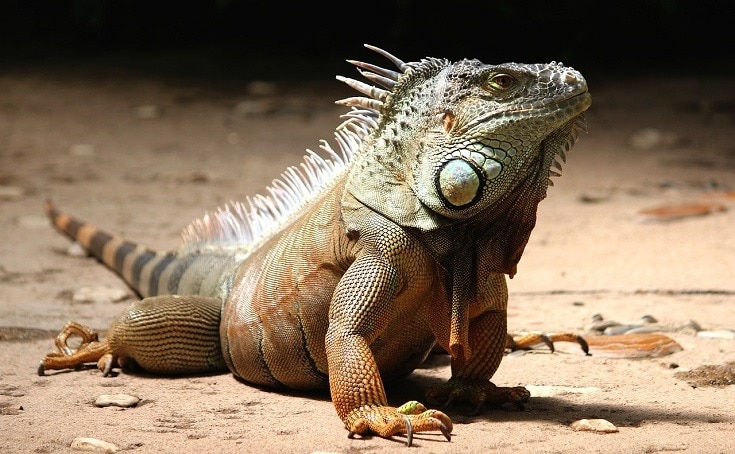
Most owners result to making their enclosure and include a variety of shelves, ramps, branches, and other items their pet can climb. Iguanas are tree-climbers by nature and need equally tall and lengthy enclosures. Your iguana will not thrive in a flat enclosure with no enrichment. Adding in branches with leaves or building the enclosure around a tree offers them a place to seek shelter to sleep and rest during the day and night.
The minimum enclosure size for a medium-sized iguana is 12 feet long, 6 feet wide, and 8 feet tall. Iguanas larger than 6 meters will require an enclosure that is 14 feet long, 7 feet wide, and 10 feet tall. This may not be easy to fit into a small garden or house and consideration should be taken to determine where the iguana will be kept. They should be sheltered from the elements like rain, harsh sun, and snow. Since they are cold-blooded, their environment should be kept warm and humid but not overly hot. Cooler spots should always be available.
The most important aspect of an iguana’s habitat will be its lighting. They require a UVB designed for reptiles so they can get a proper light exposure between 10 to 12 hours per day. This will help them to effectively produce vitamin D. This is essential for bone health. They need to be able to bask under these lights for several hours to soak up a decent amount of vitamin D. Bulb should be replaced every 12 to 18 months to ensure they have not lost their vitamin D production.
Your iguana will also require humidity of at least 70%. This can be produced from a humidifier in the enclosure. They also need a wood substrate to hold moisture for humidity and keep their environment as natural as possible.
They should always have a shallow bowl of the freshwater present.
What Should I Feed My Pet Iguana?
Iguanas’ diets can be complicated and require a balanced mix to meet their appropriate guaranteed analysis. Fresh food is essential in keeping them healthy. It is important to avoid feeding them animal protein as it can cause detrimental kidney failure in your iguana and is not an important component in their diet.
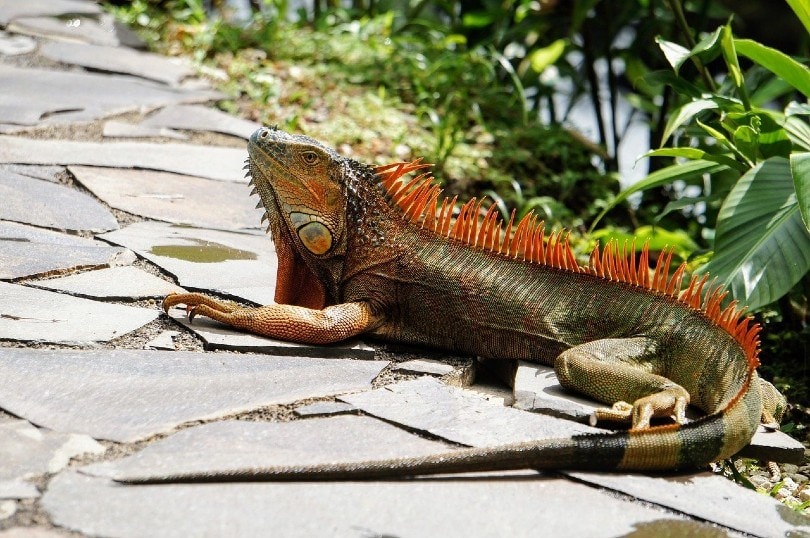
You should provide your iguana with a quality commercial mix that is purchased from a breeder, online, or an exotic pet store.
Alongside a commercial diet, they should be fed dark leafy greens, fruit, and a good calcium supplement. Food should be chopped finely or grated as iguanas do not chew their food. They should eat from a shallow bowl so they can effectively swallow the food. Consult your vet to find out the required amount of food your iguana should be fed according to their weight and age. All leftover food should be removed after 12 hours to avoid spoilage.
Keep in mind that they also have salmonella in their digestive tract, and you should keep up a strict hygiene practice. Clean all of their bowls and always wash your hands after touching them and anything inside of their enclosure.

How Do I Take Care of My Pet Iguana?
Feeding
Feed your iguana its appropriate portion of food and as often as your vet directs you to. Avoid over or underfeeding your iguana and keep all the food fresh and of high quality by various storage methods. Keep the commercial mix in an airtight container and keep all fresh veggies and fruit in the fridge.
Handling
Make sure that you handle your iguana regularly to ensure that they are kept tame. Iguanas have difficulty staying tame if they are not regularly handled. Interacting with them every day for at least 30 minutes will get them used to you. Interacting with them is important.
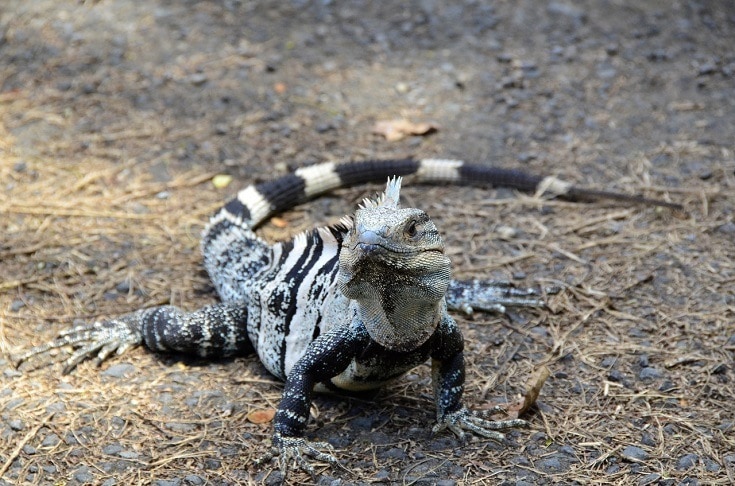
You should regularly clean inside of the enclosure to get them familiar with your presence. Handle your iguana gently once they are familiar with you, this will allow you to be able to touch and pick them up without any hassle.
Shedding
If your iguana is kept healthy it will shed its skin several times a year with minimal intervention from you. You may have to help remove some dead skin from your iguana by placing them in shallow warm water to help them shed properly. Humidity also helps with a healthy and smooth shed.
Keeping the Habitat Clean
Regular cage cleaning and maintenance will keep your iguana healthy. Remove uneaten food, feces and change the substrate when necessary. You should regularly remove waste from any ramps, platforms, and branches in the cage.

How Do I Know If My Pet Iguana Is Sick?
- Respiratory infection: Symptoms include nasal discharge, sneezing, rapid breathing, gasping for breath, loss of appetite, and lethargy. The most common cause of this infection is droughts and cold temperatures.
- Hypervitaminosis D: This is caused by an over-supplementation of vitamins or minerals. Feed your iguana an incorrect diet has also been known to cause this issue.
- Parasites: Pinworms, ticks, and mites can also present themselves on your iguana. Symptoms are shown by the parasites being present on the skin of your iguana. Pinworms cause diarrhea and weight loss in your iguana.
- Mouth rot: This bacterial infection causes hemorrhages on the gums. Swollen and excess production of thick mucous in the mouth will also be present.
- Metabolic bone disease: This is caused by improper diet and a faulty UVB bulb. Symptoms include swelling of the lower jaw or hind limbs and are shown in x-rays from a vet.

Conclusion
If you have the necessary conditions to keep an iguana healthy, they will make a great pet for you. Ensure an iguana is suited to your needs and environment. You need to be sure you can regularly maintain and care for one for its whole lifespan. Iguanas are an interesting and special pet to own. They develop their unique bond with their owner and show their intelligent nature through their personalities. We hope this article has helped inform you on how to keep a healthy and happy pet iguana.
Featured Image Credit: edofs1, Pixabay
Nicole is the proud mom of Baby, a Burmese cat and Rosa, a New Zealand Huntaway. A Canadian expat, Nicole now lives on a lush forest property with her Kiwi husband in New Zealand. She has a strong love for all animals of all shapes and sizes (and particularly loves a good interspecies friendship) and wants to share her animal knowledge and other experts’ knowledge with pet lovers across the globe.





